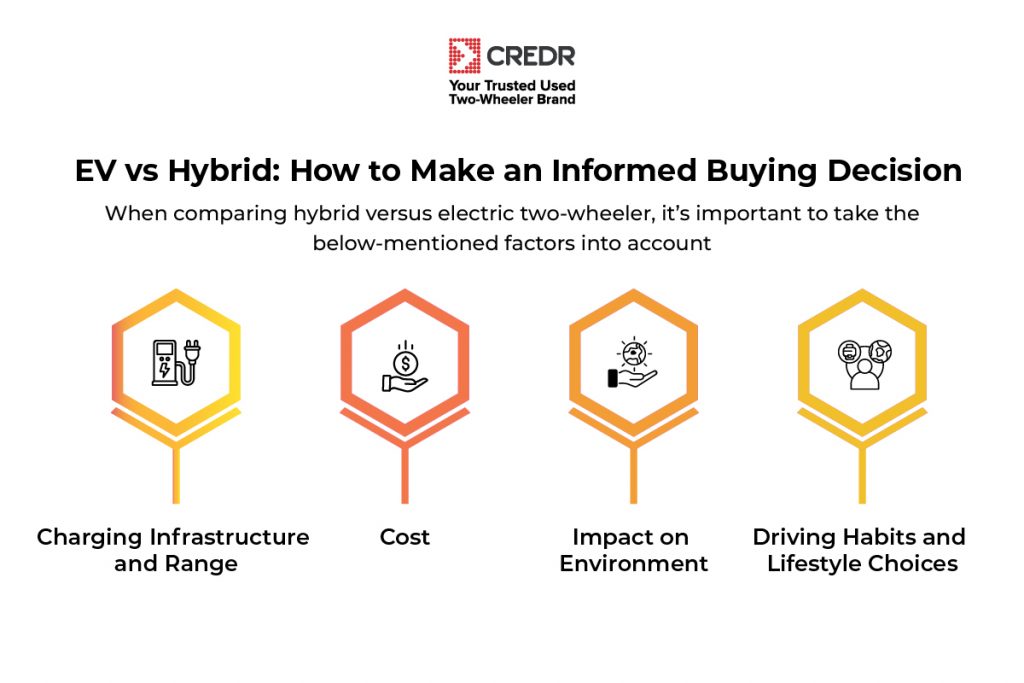The major environmental concerns like greenhouse gas emissions and pollution originate from the transportation industry. However, due to the emergence of hybrid and electric vehicles, the automotive industry has undergone drastic changes.
In recent years, the demand for sustainable vehicles has surpassed that of conventional two-wheelers. Electric and hybrid two-wheelers emerge as a sustainable option for eco-friendly riders. Riders cannot only minimize their carbon footprint but also cut down on fuel costs. Amidst the ever-evolving landscape of eco-friendly transportation, there’s a perennial debate about which is better hybrid or electric two-wheeler.
In this guide, we’ll contrast and compare electric and hybrid motorcycles. Also, this blog will walk you through the factors you need to consider when choosing an electric vs hybrid two-wheeler. We will also weigh the pros and cons of each two-wheeler to help you decide what is better hybrid or electric.
Hybrid vs. Electric Two-Wheeler: Understanding the Difference
Hybrid two-wheelers are powered by an electric motor and an Internal Combustion Engine for smooth operation. These two-wheelers operate on a combination of both electricity and fuel. Here, the ICE is backed by an electric motor, making it suitable for long trips. Meanwhile, it allows the riders to reduce their carbon footprint to a certain extent.
On the contrary, EVs rely solely on electricity for their operation. Unlike Hybrid two-wheelers, electric two-wheelers don’t come with a gas tank or an ICE. It’s important to plan EV trips carefully as electric two-wheelers are more likely to run out of battery. In most cases, it becomes difficult to find a charging station on highways. However, an electric two-wheeler eliminates fuel costs along with air and noise pollution.
Also Read: Your Perfect E-Ride Awaits: Top Electric Bikes Compared & Reviewed
Which is Better Hybrid or Electric Two-Wheeler?
Let’s weigh the pros and cons of hybrid vs electric two-wheelers.
Pros and cons of hybrid two-wheelers
The fuel efficiency of hybrid two-wheelers is comparatively better than conventional petrol-powered two-wheelers. It helps to reduce emissions and fuel costs. Equipped with an ICE, the hybrids minimize range anxiety to a great extent. In the case of low battery, it allows riders to get the best out of gasoline. When compared to electric two-wheelers, hybrids are readily available in the market. Buyers can choose from a wide variety of models. Owing to their lower upfront costs, hybrids are considered an affordable option for riders.
However, hybrid vehicles rely primarily on petrol for long trips as they come with an electric range that is relatively less than EVs. As hybrids are equipped with both internal combustion and electric parts, their cost of repair and maintenance is higher than traditional vehicles. Although hybrids offer better fuel efficiency, they can contribute to environmental pollution due to their reliance on gasoline.
Pros and Cons of Electric Two-wheelers
Electric two-wheelers significantly minimize greenhouse gas emissions and air pollution. Riders can reduce maintenance and repair costs as electric two-wheelers have fewer moving parts. These two-wheelers don’t have a clutch, fuel pump, drive belt, or a clutch.
Also, such motorcycles don’t require engine oil changes, spark filters, or air filters. government aid like tax incentives and subsidies for the purchase of EVs makes it an attractive option for customers. Offering a smooth and discreet riding experience, electric two-wheelers are also gaining popularity for responsive acceleration and instant torque.
However, the range of electric two-wheelers is lower than hybrid vehicles. In this case, it’s important to have access to charging stations, especially during longer trips. The upfront cost of electric two-wheelers is relatively higher than traditional or hybrid vehicles.

EV vs Hybrid: How to Make an Informed Buying Decision
When comparing hybrid versus electric two-wheeler, it’s important to take the below-mentioned factors into account:
1. Charging Infrastructure and Range
Make sure to consider crucial factors like access to charging infrastructure and the EV’s range when buying an electric two-wheeler. Whereas, the ICE of hybrid vehicles allows drivers to use petrol in case of battery shortage.
2. Cost
When comparing an electric and hybrid vehicle, cost plays an important role. The cost of hybrid vehicles is less than that of electric vehicles. This makes them affordable and accessible for buyers. However, as hybrid two-wheelers operate on both electric motors and ICE, the cost of maintaining them is relatively more than electric two-wheelers. On the contrary, the purchase cost of electric two-wheelers is more than that of hybrid two-wheelers. However, EVs are known for low operating and maintenance costs. Riders will no longer have to worry about increasing fuel prices or frequent servicing as these vehicles have fewer moving parts and run on rechargeable batteries.
3. Impact on Environment
Unlike the conventional ICE two-wheelers, electric and hybrid two-wheelers are an eco-friendly option. Hybrid vehicles reduce fuel consumption and carbon emissions while using electricity to cover short distances. Whereas, electric two-wheelers are known for zero tailpipe emissions and reducing greenhouse gas emissions.
4. Driving Habits and Lifestyle Choices
Driving habits and lifestyle choices can influence a rider’s buying decision to a great extent. Riders who are looking for vehicles with long-range or riders who prefer to go on long road trips frequently can opt for a hybrid two-wheeler. However, riders who are looking for a vehicle to commute daily or on short trips can consider an electric two-wheeler. Also, electric two-wheelers are a practical option for eco-conscious and budget-conscious riders.
Conclusion
Factors like range, environmental impact, driving habits, charging infrastructure, and cost play a crucial role when choosing between hybrid vs electric two-wheelers. While EVs are known for their low operating costs, hybrids are known for their extended range. Eventually, the choice can vary as per individual needs and the desire to reduce one’s carbon footprint. Weighing the advantages and disadvantages outlined in this guide will help you make an informed buying decision. You can choose a vehicle that aligns with your sustainable goals and driving needs.




